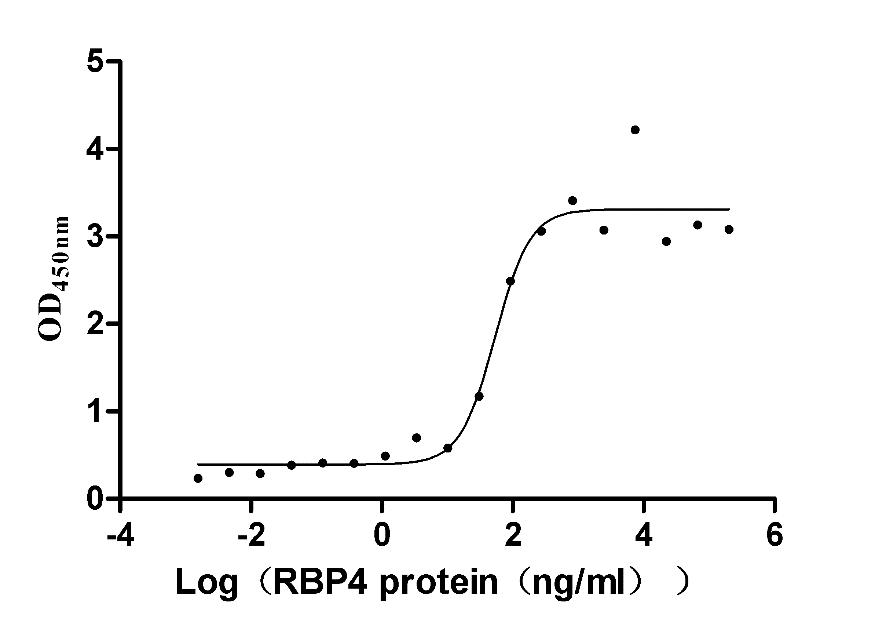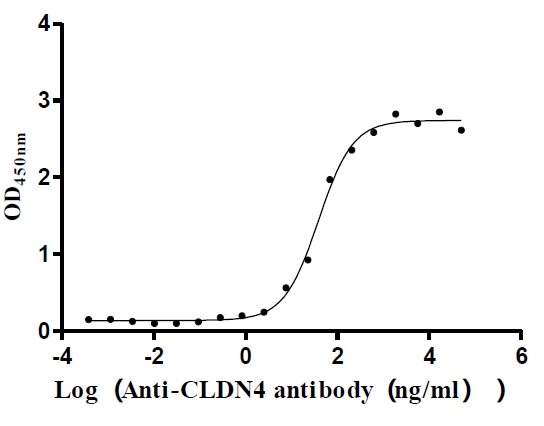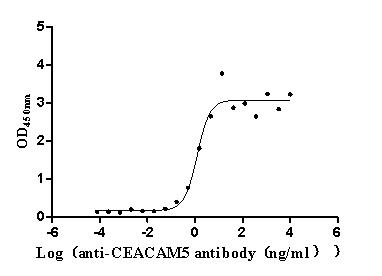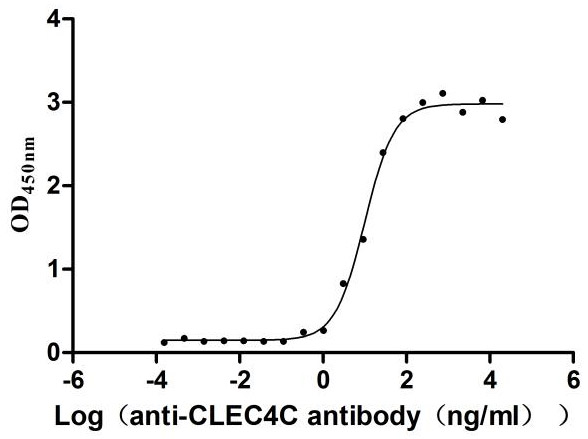Recombinant Human Arsenite methyltransferase (AS3MT)
-
中文名称:Recombinant Human Arsenite methyltransferase(AS3MT),Yeast
-
货号:CSB-YP888021HU
-
规格:
-
来源:Yeast
-
其他:
-
中文名称:Recombinant Human Arsenite methyltransferase(AS3MT),Yeast
-
货号:CSB-EP888021HU
-
规格:
-
来源:E.coli
-
其他:
-
中文名称:Recombinant Human Arsenite methyltransferase(AS3MT),Yeast
-
货号:CSB-EP888021HU-B
-
规格:
-
来源:E.coli
-
共轭:Avi-tag Biotinylated
E. coli biotin ligase (BirA) is highly specific in covalently attaching biotin to the 15 amino acid AviTag peptide. This recombinant protein was biotinylated in vivo by AviTag-BirA technology, which method is BriA catalyzes amide linkage between the biotin and the specific lysine of the AviTag.
-
其他:
-
中文名称:Recombinant Human Arsenite methyltransferase(AS3MT),Yeast
-
货号:CSB-BP888021HU
-
规格:
-
来源:Baculovirus
-
其他:
-
中文名称:Recombinant Human Arsenite methyltransferase(AS3MT),Yeast
-
货号:CSB-MP888021HU
-
规格:
-
来源:Mammalian cell
-
其他:
产品详情
-
纯度:>85% (SDS-PAGE)
-
基因名:AS3MT
-
Uniprot No.:
-
别名:2310045H08Rik; Arsenic (+3 oxidation state) methyltransferase; Arsenite methyltransferase; As3mt; AS3MT_HUMAN; C10ORF32; CYT19; Cyt19 protein; Hypothetical protein C10orf32; Methylarsonite methyltransferase; Methyltransferase cyt19; OTTHUMP00000020384; RP11-753C18.6; S adenosylmethionine arsenic (III) methyltransferase; S-adenosyl-L-methionine:arsenic(III) methyltransferase
-
种属:Homo sapiens (Human)
-
蛋白长度:full length protein
-
表达区域:1-375
-
氨基酸序列MAALRDAEIQ KDVQTYYGQV LKRSADLQTN GCVTTARPVP KHIREALQNV HEEVALRYYG CGLVIPEHLE NCWILDLGSG SGRDCYVLSQ LVGEKGHVTG IDMTKGQVEV AEKYLDYHME KYGFQASNVT FIHGYIEKLG EAGIKNESHD IVVSNCVINL VPDKQQVLQE AYRVLKHGGE LYFSDVYTSL ELPEEIRTHK VLWGECLGGA LYWKELAVLA QKIGFCPPRL VTANLITIQN KELERVIGDC RFVSATFRLF KHSKTGPTKR CQVIYNGGIT GHEKELMFDA NFTFKEGEIV EVDEETAAIL KNSRFAQDFL IRPIGEKLPT SGGCSALELK DIITDPFKLA EESDSMKSRC VPDAAGGCCG TKKSC
-
蛋白标签:Tag type will be determined during the manufacturing process.
The tag type will be determined during production process. If you have specified tag type, please tell us and we will develop the specified tag preferentially. -
产品提供形式:Lyophilized powder
Note: We will preferentially ship the format that we have in stock, however, if you have any special requirement for the format, please remark your requirement when placing the order, we will prepare according to your demand. -
复溶:We recommend that this vial be briefly centrifuged prior to opening to bring the contents to the bottom. Please reconstitute protein in deionized sterile water to a concentration of 0.1-1.0 mg/mL.We recommend to add 5-50% of glycerol (final concentration) and aliquot for long-term storage at -20℃/-80℃. Our default final concentration of glycerol is 50%. Customers could use it as reference.
-
储存条件:Store at -20°C/-80°C upon receipt, aliquoting is necessary for mutiple use. Avoid repeated freeze-thaw cycles.
-
保质期:The shelf life is related to many factors, storage state, buffer ingredients, storage temperature and the stability of the protein itself.
Generally, the shelf life of liquid form is 6 months at -20°C/-80°C. The shelf life of lyophilized form is 12 months at -20°C/-80°C. -
货期:Delivery time may differ from different purchasing way or location, please kindly consult your local distributors for specific delivery time.Note: All of our proteins are default shipped with normal blue ice packs, if you request to ship with dry ice, please communicate with us in advance and extra fees will be charged.
-
注意事项:Repeated freezing and thawing is not recommended. Store working aliquots at 4°C for up to one week.
-
Datasheet :Please contact us to get it.
相关产品
靶点详情
-
功能:Catalyzes the transfer of a methyl group from AdoMet to trivalent arsenicals producing methylated and dimethylated arsenicals. It methylates arsenite to form methylarsonate, Me-AsO(3)H(2), which is reduced by methylarsonate reductase to methylarsonite, Me-As(OH)2. Methylarsonite is also a substrate and it is converted into the much less toxic compound dimethylarsinate (cacodylate), Me(2)As(O)-OH.
-
基因功能参考文献:
- combined effect of N6AMT1 haplotype 2_GGCCAT and As3MT haplotype 2_GCAC showed consistence with the additive significance of each haplotype on % iAs: the mean was 5.47% and 9.36% for carriers with both and null haplotypes, respectively PMID: 27637898
- Maternal alleles for five of the seven SNPs (rs7085104, rs3740400, rs3740393, rs3740390, and rs1046778) were associated with urinary concentrations of iAs metabolites, and alleles for one SNP (rs3740393) were associated with birth outcomes/measures. These associations were strongly dependent upon the male sex of the fetus but independent of fetal genotype for AS3MT. PMID: 26928318
- The combined analysis confirmed evidence of genome-wide significant associations in the Han Chinese population for three loci, at 2p16.1 (rs1051061, in an exon of VRK2, P=1.14 x 10-12, odds ratio (OR)=1.17), 6p22.1 (rs115070292 in an intron of GABBR1, P=4.96 x 10-10, OR=0.77) and 10q24.32 (rs10883795 in an intron of AS3MT, P=7.94 x 10-10, OR=0.87; rs10883765 at an intron of ARL3, P=3.06 x 10-9, OR=0.87). PMID: 27922604
- AS3MT and N6AMT1 polymorphisms and urinary arsenic metabolites (%iAs, %MMA, %DMA) in 722 subjects from an arsenic-cancer case-control study in a uniquely exposed area in northern Chile, were examined. PMID: 28640505
- Risk alleles spanning multiple genes across the 10q24.32 schizophrenia-related locus are associated in the human brain selectively with an increase in the expression of both BLOC-1 related complex subunit 7 (BORCS7) and a previously uncharacterized, human-specific arsenite methyltransferase (AS3MT) isoform (AS3MTd2d3). PMID: 27158905
- A joint dose-response effect was identified for a AS3MT high-risk haplotype and inefficient arsenic methylation capacity on developmental delay. PMID: 28235556
- genome-wide association study in population in United States (AZ, OK, SD, ND): Data suggest SNPs in AS3MT (rs17878846, rs10509760) partly explain inter-individual variability in susceptibility to arsenic poisoning (and urine arsenic species patterns). PMID: 26209557
- Its genotype-dependent differences in arsenic metabolism is noted.(review) PMID: 26411936
- The present study found that rs3740400 in As3MT and rs156697 in GSTO2 were strongly associated with the arsenic species (%iAs, %MMA and MMA/iAs and DMA/MMA ratios) in urine of the occupationally exposed workers and they may influence methylation capacity. PMID: 25491248
- analysis of the functional roles of GSH and the crucial Cys residues in iAs3+ methylation catalyzed by hAS3MT PMID: 25349987
- a strong signal of positive selection in the main arsenic methyltransferase AS3MT gene, which has been previously associated with lower concentrations of the most toxic product of arsenic metabolism monomethylarsonic acid. PMID: 26366667
- This study's results provide preliminary evidence for the over-transmission of the A allele at the AS3MT rs11191454 polymorphism in Attention Deficit Hyperactivity Disorder. PMID: 25461954
- Influence of the level of arsenic exposure and the presence of T860C polymorphism in human As urinary metabolic profile PMID: 24845704
- Functions of arsenic (III) methyltransferase S-adenosylmethionine binding site were evaluated. PMID: 25447140
- Genetic variation in AS3MT gene is associated with arsenic metabolism and risk of basal cell carcinoma. PMID: 25156000
- Two SNPs, AS3MT 12390 (rs3740393) and 14458 (rs11191439) were consistently related to arsenic methylation regardless of the populations examined for the analysis. PMID: 21731446
- AS3MT SNPs were associated with arsenic metabolism efficiency and arsenic toxicity in exposed individuals. PMID: 24536095
- Low-level arsenic exposure is associated with cognitive functioning; however, this association is modified by an AS3MT gene. PMID: 24621105
- A hypomethylated region in the AS3MT promoter was associated with higher arsenic exposure.Arsenic exposure influences the epigenetic regulation of AS3MT. PMID: 24154821
- polymorphisms may impact disease susceptibility [review] PMID: 24792412
- when workers were classified according to their AS3MT Met287Thr genotypes, significantly higher micronucleus values were for those carrying the variant allele [odds ratio (OR), 3.4 (1.6-5.2); P=0.0003)] PMID: 24361376
- Genetic polymorphisms in AS3MT gene in a Western Chinese population influenced urinary arsenic metabolism from arsenic in drinking water. PMID: 24239724
- Five N6AMT1 single nucleotide polymorphisms and two N6AMT1 haplotypes were significantly associated with the percentage of methylarsonic acid in urine, even after adjusting for arsenic (+3 oxidation state) methyltransferase haplotype. PMID: 23665909
- Residues Asp76, 84, 102 and 150 greatly influence hAS3MT catalytic activity, affecting S-adenosylmethionine-binding or methyl transfer. PMID: 23742935
- Individuals with M287T and G4965C AS3MT polymorphisms had higher levels of urinary DMAs(III) and were more frequently diabetic than the respective wild-type carriers, although the excess was not statistically significant PMID: 23093101
- Data raise the possibility that, during a few thousand years, natural selection for tolerance to the environmental stressor arsenic may have increased the frequency of protective variants of AS3MT. PMID: 23070617
- the AS3MT haplotype status strongly predicted DNA methylation and gene expression of AS3MT as well as several genes in 10q2 PMID: 23341986
- Single nucleotide polymorphisms (SNPs) in arsenic methyltransferase and methylene-tetrahydrofolate reductase is associated with bladder cancer in those exposed to low concentrations of inorganic arsenic. SNPs in glutathione S-transferase omega-1 are not. PMID: 22747749
- analysis of rapid equilibrium kinetics of arsenite methylation catalyzed by recombinant human arsenic (+3 oxidation state) methyltransferase (hAS3MT) PMID: 22955273
- structural insights into the mechanism of substrate binding and catalysis PMID: 22712827
- Pregnancy and the AS3MT genotype independently influence the arsenic methylation phenotype PMID: 22547080
- Genetic polymorphisms GSTO and As3MT modify arsenic metabolism as evidenced by altered urinary arsenic excretion PMID: 22339537
- Coronary heart disease and its main risk factors were associated with low-level arsenic exposure, AS3MT polymorphism or both. Hypertension was associated with higher arsenic exposure, while hyperlipidemia was associated AS3MT polymorphism. PMID: 22341486
- These data suggest that the expression pattern of splicing variants of the As3MT gene may affect the capacity for arsenic methylation in cells. PMID: 22005461
- investigation of the roles of AS3MT in the effects of arsenicals, carcinogens found ubiquitously in nature: metabolism, toxicity, and accumulation of arsenicals in hepatocytes PMID: 21537954
- Polymorphisms in AS3MT significantly predicted As metabolism across these two very different populations, suggesting that AS3MT may have an impact on As metabolite patterns in populations worldwide. PMID: 21247820
- Distribution of 18 SNPs in AS3MT was assessed in healthy individuals in Mexico and Germany: 38 Mestizo, 69 Nahuas, 50 Huicholes, and 32 Germans. PMID: 20571777
- enzymatic activity, kinetics, thermal stability and secondary structures of mutant enzyme PMID: 20971157
- an ordered sequence for the binding of SAM and arsenite to the hAS3MT; whereas, no interactions between GSH and the hAS3MT were detected. PMID: 20621156
- As3MT effects organic arsenic metabolism PMID: 20532380
- Investigation of 46 SNPs [Mexico]: Genetic association analysis with arsenic metabolism confirmed the previously observed association between AS3MT variants, including this large cluster of linked polymorphisms, and arsenic methylation efficiency PMID: 20014157
- Data suggest that the inhibitory effect of the ions (Co(2+), Mn(2+), and Zn(2+)) or selenite on AS3MT activity might be via the interactions of them with free Cys residues in human AS3MT to form inactive protein adducts. PMID: 20129672
- The present study is the first to demonstrate the existence of genetic heterogeneity in a world wide distribution of 18 single nucleotide polymorphisms in AS3MT PMID: 19932709
- Heterologous expression of rat AS3MT in human urothelial cells...confers capacity to methylate inorganic arsenic and alters its cytotoxicity and that of methylated arsenicals. PMID: 15808521
- a strong genetic association between polymorphisms of CYT19 and D:M ratio (urinary dimethylarsenic(V) to monomethylarsenic(V))in drinking water exposed Mexican children, not adults. PMID: 15929903
- inherited variation in AS3MT may contribute to variation in arsenic metabolism PMID: 16407288
- is strongly associated with the ratio of urinary dimethylarsinic acid to monomethylarsonic acid (D/M) in children (7-11 years) but not in adults (18-79 years) PMID: 17306849
- Our results indicate that genetic polymorphisms in AS3MT contribute to inter-individual variation in arsenic biotransformation and, therefore, may contribute to inter-individual variations in risk of arsenic toxicity and arsenic carcinogenesis. PMID: 17850829
- mutation frequencies of AS3MT in Asian populations were relatively lower than those of African and Caucasian populations: frequencies of mutation in the Mongolian, Korean, and Japanese populations were 0.040, 0.010, and 0.010, respectively PMID: 17889916
- Individuals with the AS3MT(287)Thr variant display increased arsenic methylation and thus associated with increased risk for the toxic and genotoxic effects of arsenic exposure PMID: 18334919
显示更多
收起更多
-
亚细胞定位:Cytoplasm, cytosol.
-
蛋白家族:Methyltransferase superfamily, Arsenite methyltransferase family
-
数据库链接:
HGNC: 17452
OMIM: 611806
KEGG: hsa:57412
STRING: 9606.ENSP00000358896
UniGene: Hs.720370
Most popular with customers
-
Recombinant Mouse Retinol-binding protein 4 (Rbp4) (Active)
Express system: Mammalian cell
Species: Mus musculus (Mouse)
-
Recombinant Mouse Tyrosine-protein kinase Mer (Mertk), partial (Active)
Express system: Mammalian cell
Species: Mus musculus (Mouse)
-
Recombinant Human Claudin-4 (CLDN4)-VLPs (Active)
Express system: Mammalian cell
Species: Homo sapiens (Human)
-
Recombinant Human Microtubule-associated protein tau (MAPT) (Active)
Express system: Mammalian cell
Species: Homo sapiens (Human)
-
Recombinant Human Interleukin-17A (IL17A) (T26A) (Active)
Express system: Baculovirus
Species: Homo sapiens (Human)
-
Express system: Mammalian cell
Species: Homo sapiens (Human)
-
Recombinant Human Claudin-6 (CLDN6)-VLPs, Fluorescent (Active)
Express system: Mammalian cell
Species: Homo sapiens (Human)
-
Recombinant Human C-type lectin domain family 4 member C (CLEC4C), partial (Active)
Express system: Mammalian cell
Species: Homo sapiens (Human)





-AC1.jpg)
-AC1.jpg)

f4-AC1.jpg)











